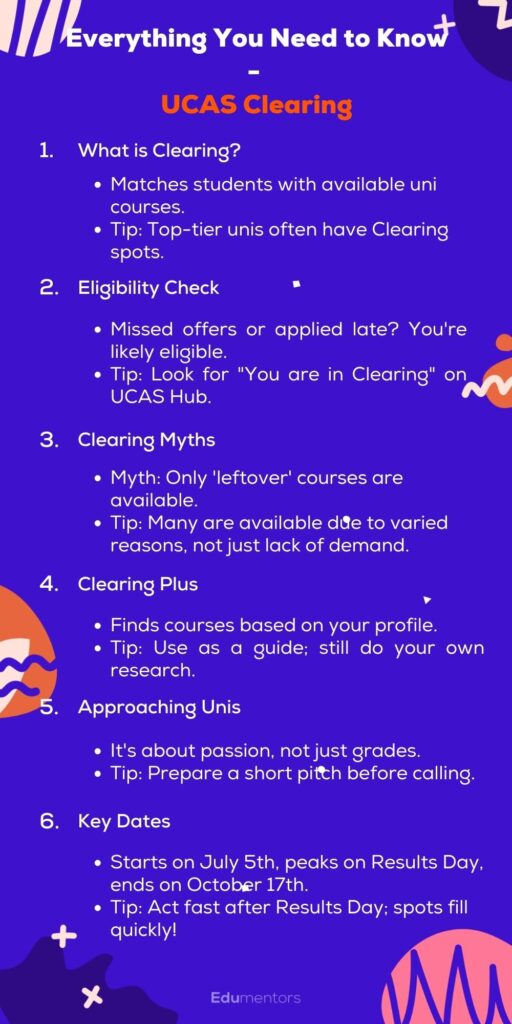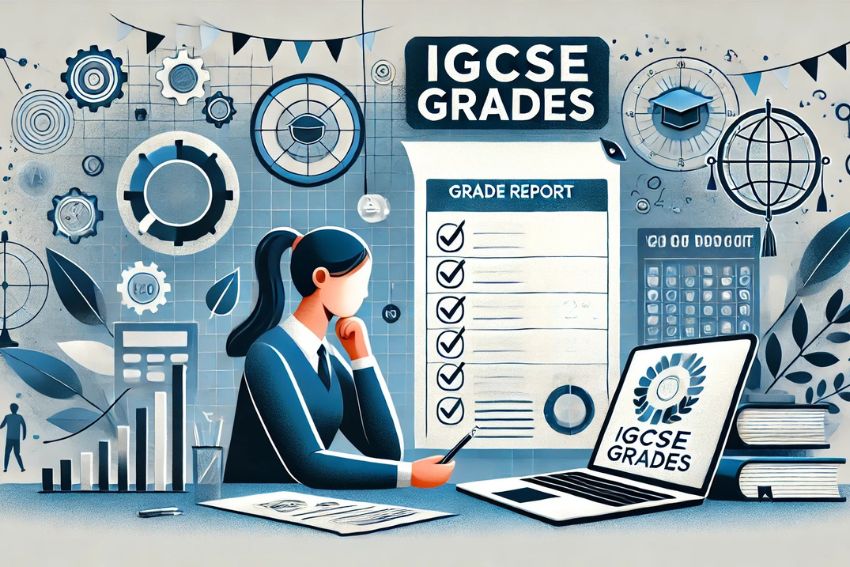How to Be Prepared for UCAS Clearing in 2026
Table of Contents:
- What is UCAS Clearing and Why You Might Need it?
- How Should You Check Your Offers?
- Can You Contact the Universities that You Declined Before?
- When Does UCAS Clearing Process Start in 2026?
- What is Clearing Plus?
- Do all Universities Offer Clearing Courses?
- Popular Clearing Courses
- Don’t Expect that it Will Be Easy to Get into a Clearing Course
- You Can Do it Better Next Year!
What is UCAS Clearing and Why You Might Need it?
UCAS Clearing is the process of matching students with university courses that still have places available.
You are eligible for clearing if you:
📌 Didn’t like any of the offers and want to find something more suitable for you;
📌 Got better grades than predicted and want to change universities;
📌 Received an offer but didn’t meet the conditions; which often happens when students don’t achieve the expected grades. Understanding Eduqas grade boundaries and how they affect GCSE results can help students better anticipate their final marks and prepare for all possibilities.
📌 Didn’t get offers at all;
📌 Missed the deadline for replying to them;
📌 Paid the multiple choice application fee (£26.50).
Clearing courses change annually and some individuals mistakenly believe that these courses are undesirable. However, this is not true. Clearing offers a wonderful opportunity for students who were not accepted into their preferred universities or who have changed their minds about attending a particular institution. Clearing is open to all students who have made an undergraduate application through UCAS and is straightforward to use.

How Should You Check Your Offers?
As soon as there is any update from universities, your UCAS hub will update too. It usually updates around 8:30am on the results day, so set your alarm clock earlier, prepare your login information, make sure that you remember the password to your UCAS account and be ready. Even if your predicted grades are low, check anyway, you can still be offered a place! 🏫
Preparing for UCAS Clearing can be a stressful time for students, but with the right strategies in place, you can navigate this period with confidence. One essential aspect of this process is understanding your UCAS points, as they play a crucial role in university admissions. If you’re unsure about how to calculate your points, our UCAS Points Calculator can be an invaluable tool. This calculator helps you convert your grades into UCAS points quickly and accurately, ensuring you have a clear understanding of your qualifications when considering different university courses. For students from Scotland with National 5, it’s important to understand how these translate into the UCAS points system and how they factor into university applications.
Can You Contact the Universities that You Declined Before?
You can always contact universities that you declined or even universities that rejected you, there is nothing to lose, but don’t be too hopeful. They may see that gesture as you being determined and motivated to study at their university and reconsider you. They may write down your information and contact you if someone else chooses to not take the course. However, they may just offer you a place in a similar course of theirs or tell you to come back to them next year. But then again, if you really want to study at that university, why not try?
When Does UCAS Clearing Process Start in 2026?

Candidates eligible for clearing will be informed via email, marking their inclusion on the “Clearance list”. Simultaneously, your UCAS hub status will reflect either “you are in clearing” or “clearing has started”. If you’re certain about your eligibility but haven’t received the email or seen a status change, it might be due to pending grade updates or ongoing considerations by certain universities.
While clearing commences from July 5th and runs until October 17th for those who applied to a university post-June 30, it formally kickstarts on results day for everyone else. However, being prepared well in advance is crucial. Even if you’re optimistic about your grades, it’s wise to have a contingency plan. Speed is of the essence during clearing, as delays might lead someone else to snag your desired spot.
Harness the power of UCAS’s search tool to pinpoint intriguing courses with possibly lower prerequisites than your initial choices. With over 35,000 courses available through clearing this year, you’re bound to uncover a fitting option. Draft a list of potential universities, gearing up to reach out and possibly interview with them come results day. And crucially, ensure you have essential documents, like your UCAS number, clearing number, and grades, on hand before initiating contact.
What is Clearing Plus?
If you were unsuccessful with your application or you are applying for a place in clearing for the first time, you are eligible to use clearing plus. UCAS looks at the courses you originally applied for, your qualifications and grades, then analyses students similar to you from previous years and what they opted for, and then gives you a list of matches.
If you qualify for clearing plus, you’ll see the button “See matches”. This tool is helpful for finding good matches easily, however that does not mean you should not still research courses on your own. Sometimes, places fill up fast and you should have many options available. Clearing plus can be beneficial to everyone, even if you don’t have your choices submitted yet, UCAS will still find matches for you by your qualifications alone.
Do all Universities Offer Clearing Courses?
Even though more and more universities list their courses in clearing every year, some of them simply refuse to partake in the clearing. Universities such as Oxford and Cambridge (and some other Russell Group universities) never offer clearing.
Medicine, dentistry and other popular degrees also don’t take part in clearing, since they have too many applicants already.
Popular Clearing Courses
Top ten clearing courses this year were:
- Communication and documentation
- History and Philosophy
- Education
- Physical Sciences
- Computer Sciences
- Law
- Engineering
- Art and Design
Don’t Expect that it Will Be Easy to Get into a Clearing Course
Even though clearing courses are considered to be disreputable or the ones that will result in you having a low-paid job, it’s not true at all. Even if it was correct, it’s not as easy to get into them as you might think it is. As soon as the results are up, the UCAS website turns into a battlefield. Admissions officers of different universities have different approaches too. Some may just ask you for your grades and some can have a whole interview over the phone. Remember, you have many competitors, so don’t take this task lightly.
Take all of the tips mentioned above into consideration and our last tip would be – don’t worry! Bad grades can be the result of many things and it may have nothing to do with your knowledge, so self-confidence is really important at this time. Believe in yourself and fight for your dreams. The UCAS clearing is just one of the ways to apply to universities.
You Can Do it Better Next Year!
Just make sure you like the alternative courses too, don’t make hasty decisions out of nerves, you can always take a gap year and retake the exam with more experience and confidence. And remember, you can always find someone who already studies at your dream university and book mentoring sessions with them at Edumentors. One great example is Zac from Warwick University:
Zac S. – “A second-year undergraduate student at the University of Warwick (Physics, BSc). He always loved studying Physics and Maths and has over 3 years experience as a Maths tutor, both in secondary school and privately at GCSE and A-Level”.
You can book sessions with him or any other excellent tutor from the university of your choice. Ask them to help you prepare for the next year’s exams or receive mentorship on how to increase your chances of getting an offer letter. But most importantly, remember, your entire life is still ahead and a one-year gap can be a great opportunity to get where you wanted to be.
FAQs:
How does UCAS Clearing work?
UCAS Clearing is a system that helps students find a university place if they do not already hold a confirmed offer.
Clearing applies if:
- You did not receive any offers
- You declined your offers
- You missed the conditions of your firm choice
- You applied late
Universities list available courses in Clearing. You contact them directly, discuss your grades, and secure verbal permission before adding a Clearing choice in UCAS Hub.
Clearing is competitive. Places can fill quickly. Speed and preparation matter.
How do you add a Clearing choice on UCAS?
You can only add one Clearing choice at a time.
The process is simple:
- Log in to UCAS Hub
- Go to Your choices
- Select Add Clearing choice
- Enter the course and university details
- Submit the choice
You must have confirmation from the university before doing this.
Once submitted, the university can accept or decline your application. If declined, you can add another Clearing choice.
When is UCAS Clearing 2026?
UCAS Clearing typically opens in early July and runs until mid-October.
For 2026, the exact opening date has not yet been confirmed. UCAS usually publishes final dates in the spring.
That said, Clearing does not revolve around Results Day only. Many courses open in July, and popular options may close before August.









